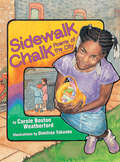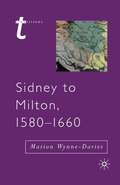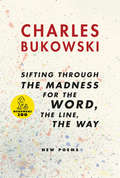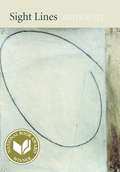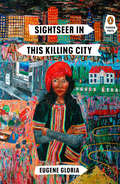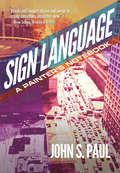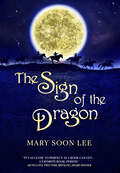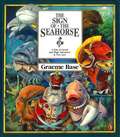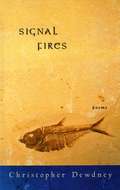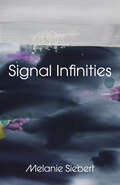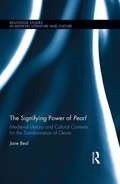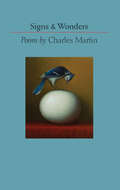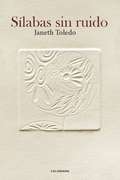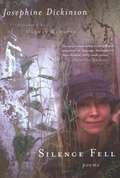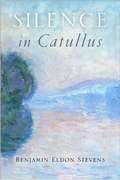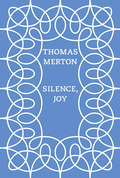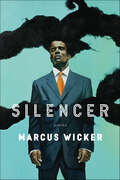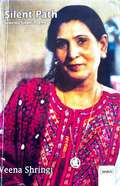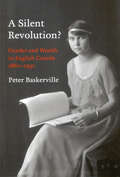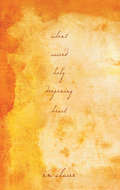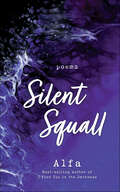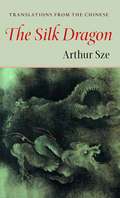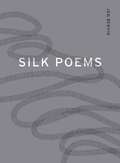- Table View
- List View
Sidewalk Chalk: Poems of the City
by Carole Boston WeatherfordAt every corner, down every block, a city percolates with people at work and play: girls jumping double Dutch, the shoeshine man polishing a pair of wing tips, boys heading toward the basketball court. Each neighborhood is filled with unique characters (the beautician, the barber, the short-order cook) and places (the storefront churches, the outdoor market, the park pool) - all as familiar as family. Carole Boston Weatherford pays tribute to these sights and sounds of urban life in twenty fresh and rhythmic poems. In quiet moments and lively street scenes, her work captures the excitement and diversity found in these places that have "no trees / to climb" but where people young and old still "reach for the stars." Dimitrea Tokunbo's vivid illustrations are sure to delight.
Sidney to Milton, 1580–1660 (Transitions Ser.)
by Marion Wynne-DaviesThis invaluable guide offers readers an accessible and imaginative approach to the literature of early modern Britain. Exploring the poetry, drama and prose of the period, Marion Wynne-Davies combines theory and practice, providing a helpful introduction to key theoretical concepts and close readings of individual texts by both canonical and less well-known authors. Amongst other things, Wynne-Davies discusses sixteenth- and seventeenth-century poetry in its political and cultural contexts, considers Renaissance drama in terms of performance space, and uses the early modern map to explain the prose works of writers such as Bunyan and Cavendish.
sifting through the madness for the word, the line, the way: New Poems
by Charles Bukowskifrom "neither Shakespeare nor Mickey Spillane"young young young, only wanting the Word, going mad in the streets and in the bars,brutal fights, broken glass, crazy women screaming inyour cheap room,you a familiar guest at the drunk tank, NorthAvenue 21, Lincoln Heightssifting through the madness for the Word, the line the way,hoping for a check from somewhere,dreaming of a letter from a great editor:"Chinaski, you don't know how long we've beenwaiting for you!"no chance at all.
Sightlines
by Arthur SzeFinalist for the 2019 National Book AwardFrom the current phenomenon of drawing calligraphy with water in public parks in China to Thomas Jefferson laying out dinosaur bones on the White House floor, from the last sighting of the axolotl to a man who stops building plutonium triggers,Sight Lines moves through space and time and brings the disparate and divergent into stunning and meaningful focus. In this new work, Arthur Sze employs a wide range of voices--from lichen on a ceiling to a man behind on his rent--and his mythic imagination continually evokes how humans are endangering the planet; yet, balancing rigor with passion, he seizes the significant and luminous and transforms these moments into riveting and enduring poetry.
Sightseer in This Killing City (Penguin Poets)
by Eugene GloriaA fourth collection from a prize-winning poet whose "gift is breathtaking" (Naomi Shihab Nye)Eugene Gloria's Sightseer in This Killing City captures the surreal and disorienting feelings of the present. In the wake of recent presidential elections in the United States and in the Philippines, Gloria's latest collection sharpens his obsession with arrivals and departures, gun violence, displacement, cultural legacy, and the bitter divisions in America. Through the voice of Nacirema, the central persona of the collection, we are introduced to a character who chooses mystery and inhabits landscapes fraught with beauty and brutality. Gloria quotes melodies from seventies soul and jazz, blending the urban lament of Thelonious Monk and John Coltrane with the idiom of Stevie Wonder and Fela Kuti. Sightseer in this Killing City is an argument for grace and perseverance in an era of bombast and bullies.
Sign Language
by John S. PaulIn photos, drawings and words, Sign Language pays homage to the lost art of urban outdoor sign painting. In a working environment both novel and ambitious, author John S. Paul found success, noting, "No other job gave me such a direct impact on the urban landscape, or such physical engagement. Painting signs over Broadway in 1984 was a rare look down from the elevated height of a heroic messenger." Few books have ever provided such an insider perspective into this unique livelihood of days past. In 40 photos and 30 poems and stories, the author creates an immersion into a rarefied world on danger and beauty, raising the sense of the importance of moments and blurring the boundary between public and private space.
The Sign of the Dragon: The Sign Of The Dragon Book 1
by Mary Soon LeeWinner of the Elgin Award!“It’s as close to perfect as a book can get… I already know this will be one of my favorites for the year. A favorite book, period.” — Beth Cato, two-time Rhysling Award winnerDrawing on Chinese and Mongolian elements, SFPA Grand Master Mary Soon Lee has penned an epic of politics, war, and the reach of dragons — perfect for fans of Game of Thrones and Beowulf.As the fourth-born prince of Meqing, Xau was never supposed to be king. But when his brothers are deemed unfit to rule and eaten by a dragon, as is the custom, Xau finds himself on the throne. The early years of his reign are marred by earthquake, flood, and war. Then a demon thought long-dead returns, leaving devastation in its wake, and Xau must broker peace with his enemies. Can their combined strength vanquish the demon before it destroys them?In the tradition of the Iliad, the Epic of Gilgamesh, and Beowulf, The Sign of the Dragon is told in poetry. Many of the individual poems appeared in award-winning magazines such as Apex Magazine, The Magazine of Fantasy & Science Fiction, and Strange Horizons. This is the revised ebook edition of the entire epic and is accompanied by forty extraordinary full-page illustrations by Gary McCluskey.Praise for The Sign of the Dragon:“What an utterly beautiful, impressive, & occasionally heartbreaking reading experience!” — Ann K. Schwader, SFPA Grand Master“This is an absolutely stunning work that I will read and reread.” — T. Frohock, author of the Los Nefilim series
The Sign of the Seahorse: A Tale of Greed and High Adventure in Two Acts
by Graeme BaseThe inhabitants of a coral reef are threatened when a shady real estate deal started by the greedy Groper floods their area with poisonous waste.
Signal Fires
by Christopher DewdneyChristopher Dewdney’s love for the landscape and the flora and fauna of southwestern Ontario has provoked some of the most gorgeously erotic prose ever to appear in this country. From that love, augmented by ardent research in the field, emerges a marvellously compelling, futuristic vision of time and space collapsed into near-simultaneity. Books IV and V of The Natural History of Southwestern Ontario, presented in Signal Fires, are self-contained sections of a continuing prose poem deeply satisfying in its density. The New-Old World of this long poem, written over a fifteen-year period, is sensuously and conceptually so immediate that orgasm and epiphany are one in it. This is writing, and reading, as immersion. Accompanying the natural histories in Signal Fires are poems with a different but equally involving music, lyrics of loss and redemption in which human relationships are central.
Signal Infinities: A Poem
by Melanie SiebertExpansive and moving, Signal Infinities courses with the intelligences of the body, its music and limits, in search of more enlivening, ethical relationships with each other and the earth.In Signal Infinities a therapist takes up an apprenticeship to a lake, to bare attention. Pain arrives. Collective and personal injuries and errors pile up. The glaciers and ancient forests are disappearing.Unlike the Iliad&’s soldiers, the cast of youth in this long poem harbour traumas that are internal, hidden, unsung. Yet each wounded one flickers with defiance and dignity. So too the blue-collar winds, the little brown bats and roadside ferns who send out their urgent signals.With unbridled oxygen affinity, this work attunes to submerged sensations, reflexes, tonal shifts, chemical transmissions and streaming kinesics. It seeks an ethics that respects the body&’s imperfect intercom, its private coulees and unstable weathers, its sheer limits.Amid too-little-too-late conditions, Signal Infinities floods with connections that are elemental, illuminating and wildly felt.
The Signifying Power of Pearl: Medieval Literary and Cultural Contexts for the Transformation of Genre
by Jane BealThis book enhances our understanding of the exquisitely beautiful, fourteenth-century, Middle English dream vision poem Pearl. Situating the study in the contexts of medieval literary criticism and contemporary genre theory, Beal argues that the poet intended Pearl to be read at four levels of meaning and in four corresponding genres: literally, an elegy; spiritually, an allegory; morally, a consolation; and anagogically, a revelation. The book addresses cruxes and scholarly debates about the poem’s genre and meaning, including key questions that have been unresolved in Pearl studies for over a century: * What is the nature of the relationship between the Dreamer and the Maiden? * What is the significance of allusions to Ovidian love stories and the use of liturgical time in the poem? * How does avian symbolism, like that of the central symbol of the pearl, develop, transform, and add meaning throughout the dream vision? * What is the nature of God portrayed in the poem, and how does the portrayal of the Maiden’s intimate relationship to God, her spiritual marriage to the Lamb, connect to the poet’s purpose in writing? Noting that the poem is open to many interpretations, Beal also considers folktale genre patterns in Pearl, including those drawn from parable, fable, and fairy-tale. The conclusion considers Pearl in the light of modern psychological theories of grieving and trauma. This book makes a compelling case for re-reading Pearl and recognizing the poem’s signifying power. Given the ongoing possibility of new interpretations, it will appeal to those who specialize in Pearl as well as scholars of Middle English, Medieval Literature, Genre Theory, and Literature and Religion.
Signs & Wonders (Johns Hopkins: Poetry and Fiction)
by Charles MartinWinner of the CNY Book Award in Poetry of the YMCA of Greater SyracuseSigns is a noun (as in DO NOT DISTURB);Wonders (as in "with furrowed brows"), a verb. The couplet that leads into Charles Martin's fifth collection of richly inventive poems suggests that the world is to be read into and wondered over. The signs in this new work from the prize-winning American poet of formal brilliance and darkly comic sensibility are as stark as the one on a cage at the zoo that says ENDANGERED SPECIES, as surprising as those that announce the return of irony, and as enigmatic as a single word carved on a tombstone. Renowned for his translations of Ovid's Metamorphoses and the poems of Catullus, Martin brings the perspective of history to bear on the stuff of contemporary life.
Sílabas sin ruido
by Janeth ToledoUn poemario que surge desde el verbo que se hace en silencio, en íntima comunión con su cuerpo y la naturaleza. Desde hace más de veinte años y hasta el día de hoy -cuando al parecer ha fijado ya su residencia definitiva en la tierra- Janeth Toledo ha vivido en distintos parajes del Valle de los Chillos en los cuales ha afinado su percepción y comprensión de la naturaleza. En ese diálogo con el paisaje -entendido como espacio de meditación y reflexión- Janeth encuentra buena parte de los elementos con los que construye sus poemas: sutiles visiones del entorno en las que proyecta sus emociones y su memoria, o al revés: el caudal de su experiencia afectiva transformando y resignificando el paisaje que habita. «Después de la lloviznatodo campo es más verdebrilla la hojay en su nervadura late febrilel pulso de la vida.» En el filón creativo de los poetas románticos, la autora interioriza la naturaleza, la hace pasar por su cuerpo y sus afectos para devolverla al lector trastocada, en forma de imágenes reveladoras, elocuentes en su laconismo y en su sigilo. Si sus palabras «nacen en la opacidad», su voz ruge «en el primer aliento / de las valvas». Esta hermosa imagen inaugural acaso resuma su dicción y su verdad: traducir el grito del cuerpo a una lengua de secretos y murmullos, decir la vida a través de las pequeñas hendiduras del cuerpo, aquellas que abren el sexo y los sentidos, nuestros más precisos instrumentos de conocimiento y de comunicación. Con este pequeño, íntimo, entrañable poemario, Janeth Toledo debuta en la poesía para cantar en voz baja y eficaz las profundas certezas e incertidumbres que no invaden ahora mismo. Hay que apegarla oreja para escuchar su rugido. Cristóbal Zapata
Silence Fell
by Josephine DickinsonSilence Fell marks the American debut of an extraordinary poet from the remote north of England. The poems are set on a sheep farm in the northern mountains and tell the story -- in the form of a modern shepherd’s calendar -- of Josephine Dickinson’s marriage to a Cumbrian sheep farmer, a man more than twice her age, and their life together, until his death in 2004. During a reading tour in England, Galway Kinnell was introduced to Josephine Dickinson’s work. Her poems made such an impression on him that he passed the books on to his publisher and wrote a foreword for her American debut.
Silence in Catullus
by Benjamin Eldon StevensBoth passionate and artful, learned and bawdy, Catullus is one of the best-known and critically significant poets from classical antiquity. An intriguing aspect of his poetry that has been neglected by scholars is his interest in silence, from the pauses that shape everyday conversation to linguistic taboos and cultural suppressions and the absolute silence of death. In "Silence in Catullus," Benjamin Eldon Stevens offers fresh readings of this Roman poet's most important works, focusing on his purposeful evocations of silence. This deep and varied "poetics of silence" takes on many forms in Catullus's poetic corpus: underscoring the lyricism of his poetry; highlighting themes of desire, immortality-in-culture, and decay; accenting its structures and rhythms; and, Stevens suggests, even articulating underlying philosophies. Combining classical philological methods, contemporary approaches to silence in modern literature, and the most recent Catullan scholarship, this imaginative examination of Catullus offers a new interpretation of one of the ancient world's most influential and inimitable voices.
Silence, Joy
by Thomas Merton Christopher WaitAn inspiring gift-edition of poetry and prose from the world's favorite monk-poet In this day of mindless distraction, we’re desperate for reasons to put down our phones and reconnect with our spiritual selves. In time for the 50th anniversary of Thomas Merton's death in 1968, Silence, Joy is an invitation to slow down, take a breath, make a space for silence, and open up to joy. <P><P> Poet, monk, spiritual advisor, and social critic, Thomas Merton is a unique—and uniquely beloved—figure of the twentieth century, and this little rosary brings together his best-loved poems and prose. Drawn from classics like New Seeds Of Contemplation and The Way Of Chuang Tzu as well as less famous books, the writings in Silence, Joy offer the reader deep, calming stillness, flights of ecstatic praise, steadying words of wisdom, and openhearted laughter. Manna for Merton lovers and a warm embrace for novices, this slim collection is a delightful gift.
Silencer: Poems
by Marcus Wicker&“Tough talk for tough times. Silencer is both lyrical and merciless–Wicker&’s mind hums in overdrive, but with the calm and clarity of a marksman.&” —Tim Seibles, author of One Turn Around the Sun and finalist for the National Book Award A suburban park, church, a good job, a cocktail party for the literati: to many, these sound like safe places, but for a young black man these insular spaces don&’t keep out the news—and the actual threat—of gun violence and police brutality, or the biases that keeps body, property, and hope in the crosshairs. Continuing conversations begun by Citizen and Between the World and Me, Silencer sings out the dangers of unspoken taboos present on quiet Midwestern cul-de-sacs and in stifling professional settings, the dangers in closing the window on &“a rainbow coalition of cops doing calisthenics around/a six-foot, three-hundred-fifty-pound man, choked back into the earth for what/looked a lot, to me, like sport.&” Here, the language and cadences of hip-hop and academia meet prayer—these poems are crucibles, from which emerge profound allegories and subtle elegies, sharp humor and incisive critiques. &“There is not a moment in this book when you are allowed to forget the complexities of a black man's life in America. These poems evoke so much—strength, beauty, passion, fear. There is the quiet, ironic pleasure of life on a cul-de-sac juxtaposed with the tensions of always wondering when a police officer's gun or fists might get in the way of the black body. The stylistic range of these poems, the wit, and the intelligence of them offers so much to be admired. There is nothing silent about Silencer. What an outstanding second book from Marcus Wicker.&” —Roxane Gay &“Marcus Wicker&’s masterful and hard-hitting second collection is exactly the book we need in this time of malfeasance, systemic violence, and the double talk that obfuscates it all... He writes the kinds of vital, clear-eyed poems we can turn to when codeswitching slogans and online power fists no longer get the job done. These are poems whose ink is made from anger and quarter notes. They remind us that to remain silent in the face of aggression is to be complicit and to be complicit is not an option for any of us.&” —Adrian Matejka, author of The Big Smoke and finalist for the National Book Award and Pulitzer Prize&“Silencer is an important book of American poetry: wonderfully subtle, wholly original, and subversive. Politics and social realities aside, this is foremost a book that delights in language, how it sounds to the ear and plays to the mind. We have suburban complacency played against hip-hop resistance, Christian prayers uttered in the face of dread violence, real meaning pitted against materialism, and love, in its largest measure, set against ignorance.To say Silencer is a tour de force would be an understatement. What a work of true art this is, and what a gift Marcus Wicker has given to us.&”—Maurice Manning, author of One Man&’s Dark and finalist for the Pulitzer Prize "Silencer disarms and dazzles with its wisdom and full-throated wit. [This] collection snaps to attention with a soundtrack full of salty swagger and a most skillful use of formal inventions that&’ll surely knock you out. Here in these pages, sailfish and hummingbirds assert their frenetic movements on a planet simmering with racial tensions, which in turn forms its own kind of bopping and buoyant religion. What a thrill to read these poems that provoke and beg for beauty and song-calling into the darkest of nights."—Aimee Nezhukumatathil, author of Lucky Fish and poetry editor at Orion Magazin
Silent Path: Selected Sindhi Poems
by Veena ShringiSilent Path is a collection of selected Sindhi Poems by Veena Shringi which are translated into english by Dr. Vinod Asudani.
A Silent Revolution?: Gender and Wealth in English Canada, 1860-1930 (Hugh MacLennan Poetry Series #24)
by Peter BaskervilleA Silent Revolution? explores how urban women managed wealth at a time when they were thought to have little independence - including economic - and shows that women were in fact important players in the world of capital.Peter Baskerville situates women in their immediate gendered and familial environments as well as within broader legal, financial, spatial, temporal, and historiographical contexts. He analyses women's probates, wills, land ownership, holdings of real and chattel mortgages, investment in stocks and bonds, and self employment, revealing that women controlled wealth to an extent similar to that of most men and invested and managed wealth in increasingly similar, and in some cases more aggressive, ways.Traditional historiography has highlighted women's fight to acquire cultural and political rights during this period, but it is less well known that women acquired and exercised many economic rights as well. In doing so they put pressure on men to reconceptualize the notion of middle class and women's proper place.
Silent Sacred Holy Deepening Heart
by Em ClaireThis collection is from the pen of Neale Donald Walsch’s wife, Em Claire. These warmly engaging poems are divided into three sections Remembering, Naked, and Forgetting.The purpose of the poetry of Em Claire is written with the intention of celebrating the Oneness of all Creation and exploring the mystery of who we are. Claire envisions her work as "a lantern in the window to which you have just this moment lead yourself, for reasons your own Self and Soul know."This is a book for those who loved the work of Hugh Prather and Rod McKuen; for those interested in using the power of language for healing and power growth. And, of course, this is a book for the many fans of Neale Donald Walsch.
Silent Squall: Poems
by AlfaA poetic portrayal of the unseen tempests of emotional and physical abuse from the bestselling author of Abandoned Breaths and I Needed a Viking.Raw and honest, the acclaimed author of I Find You in the Darkness shares her intensely personal, yet relatable stories through finely woven poetry. This new edition of Silent Squall includes an updated introduction and a brand-new chapter of modern poetry. Find understanding, comfort, and hope from the affecting poetry of Silent Squall.I have singed wings,and the edges of my heartare charred, and crispby flames of your dismissal.Yet even though I siftthrough ashes of the past,as I maneuver throughtomorrow . . . my soul’s fingerprintwill be everlasting.—Alfa
Silk Dragon
by Arthur SzeArthur Sze has rare qualifications when it comes to translating Chinese: he is an award-winning poet who was raised in both languages. A second-generation Chinese-American, Sze has gathered over 70 poems by poets who have had a profound effect on Chinese culture, American poetics and Sze's own maturation as an artist. Also included is an informative insightful essay on the methods and processes involved in translating ideogrammic poetry.MOONLIGHT NIGHTby Tu Fu can only look out alone at the moon. From Ch'ang-an I pity my children who cannot yet remember or understand.Her hair is damp in the fragrant mist. Her arms are cold in the clear light. When will we lean beside the window and the moon shine on our dried tears?Sze's anthology features poets who have become literary icons to generations of Chinese readers and scholars. Included are the poems of the great, rarely translated female poet Li Ching Chao alongside the remorseful exile poems of Su Tung-p'o. This book will prove a necessary and insightful addition to the library of any reader of poetry in translation.The poets include: T'ao Ch'ien Wang Han Wang Wei Li Po Tu Fu Po Ch -yi Tu Mu Li Shang-yin Su Tung-p'o Li Ch'ing-chao Shen Chou Chu Ta Wen I-to Yen ChenArthur Sze is the author of six previous books of poetry, including The Redshifting Web and Archipelago. He has received the Asian American Literary Award for his poetry and translation, a prestigious Lannan Literary Award, and was recently a finalist for the Leonore Marshall Poetry Prize. He teaches at the Institute of American Indian Arts.from A Painting of a CatNan Ch'uan wanted to be reborn as a water buffalo, but who did the body of the malicious cat become? Black clouds and covering snow are alike. It took thirty years for clouds to disperse, snow to melt.-Pa-ta-shan-jen (1626-1705)The Last DayWater sobs and sobs in the bamboo pipe gutter. Green tongues of banana leaves lick at the windowpanes. The four sur
Silk Poems
by Jen BervinIn conjunction with Tufts University’s Silk Lab’s cutting-edge research on liquified silk, Jen Bervin wrote a poem composed in a six-character chain that corresponds to the DNA structure of silk; modeled on the way a silkworm applies filament to its cocoon. This poem, written from the perspective of the silkworm, explores the cultural, scientific, and linguistic complexities of silk written inside the body.
Silly Sally
by Audrey Wood"Silly Sally went to town, walking backwards, upside down." And that's just the beginning... Come along with silly Sally and her silly companions as they parade into town in a most unusual way.
